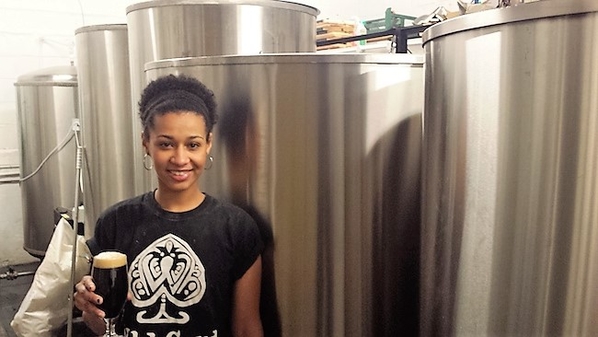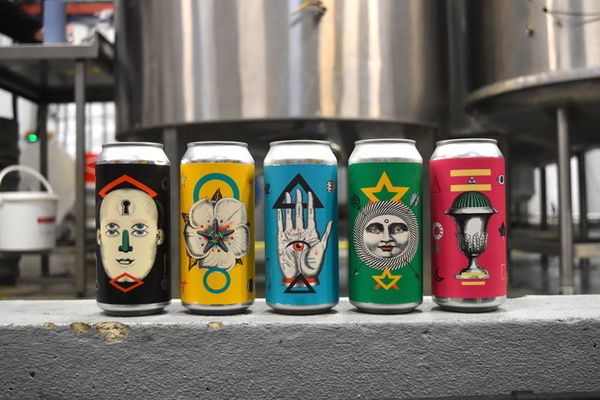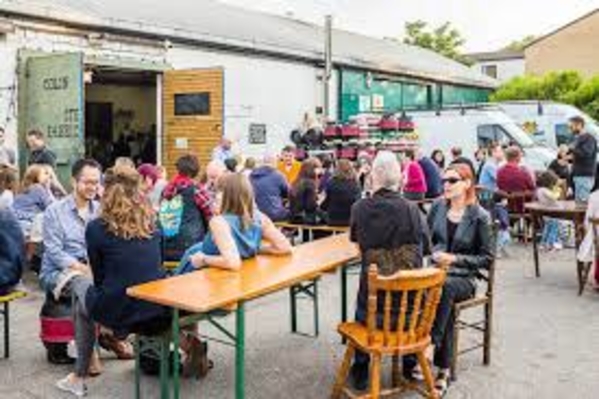Jaega: Wild over beer in Walthamstow
Added: Monday, January 21st 2019

The team at the Wild Card Brewery had their Christmas dinner on 18 January. Head brewer Jaega Wise is at pains to explain that they’re not members of a weird religious cult that celebrates the festivities at a different time of year to the rest of us. The reason for the delay is that they’ve been brewing flat out to keep up with the demand for their beers.
Wild Card is based in Walthamstow in the furthest reaches of East London and it comes as a surprise to discover that Jeaga and her co-founders, William Harris and Andrew Birkby, all hail from the Nottingham area.
They were good friends in the Midlands and shared a love of beer, including dabbling in home brewing. The switch to London was the result of Jaega’s move to the capital to work as a chemical engineer – she now has the impressive credentials of BeEng (DIS) Hons on her CV – and she encouraged William and Andrew to join her and launch their own brewery.
Nottingham was crammed with small brewers while Walthamstow offered greater possibilities for making and selling beer. Jeaga understood the chemistry of brewing and William had worked as a cask washer at the Mansfield Brewery but all three needed more time learning the ropes with a commercial producer.
Wild Card started life as a “cuckoo brewery”, using the kit at the Brentwood Brewery in Essex. They not only got to grips with brewing on grown-up vessels but Jaega was also influenced by Sophie La Ronde, head brewer at Brentwood and an outspoken critic of sexism in the industry. Jaega picked up Sophie’s mantle and speaks regularly about the need for brewing to involve more women in production and not consign them to back-room jobs.
As a result of the Brentwood experience, the three were able to open a six-barrel plant at the Ravenswood Industrial Estate in Walthamstow in 2012, with Jaega as head brewer or brewster. Success came quickly, with the brewery winning awards for its first beers. In December, Jeaga picked up the prestigious prize of Brewer of the Year from the influential British Guild of Beer Writers.

In 2017, the three directors organised a crowd-funding campaign to raise funds for a bigger site and were able to move the following year to a unit on another industrial estate, Lockwood Way, near the major Blackhorse Road train and Underground hub. There was also financial help from the government’s Brightside Trust that helped young people find work: everyone at Wild Card gets at least the minimum wage. “Helped” is in the past tense as the trust has since been wound up.
You enter the Lockwood site through a tiny door with an arrow on a neon sign promising BEER like an American Speakeasy. But once inside you’re in a spacious area of ground floor and mezzanine, with brewing vessels to one side, seats upstairs for drinkers on open days, and plenty of room for expansion in what used to be an underwear factory. From pants to pints, you could say.
It’s still a six-barrel operation but shiny new conical fermenters have been added to the two original open ones and they have doubled capacity. But Jaega urgently needs a new and bigger mash tun in order to keep pace with demand.
The new fermenters have allowed the team to brew lager, setting aside one vessel where a true bottom-fermenting lager strain can be used. Joker is 4.4 per cent and is brewed with three English hops, Epic, Pioneer and Target. It’s aged for five to six weeks and Jaega shows her brewing credentials by explaining the beer has a “diactyl rest” to remove the butterscotch notes that no discerning lager brewer wants in his or her beer. Joker has rapidly become Wild Card’s biggest seller. Sniffing the aroma of honeyed malt and floral hops I was transported back to my first taste of true lager in a beer garden in Munich many moons ago.
As I chat with Jaega, William, Andrew and other members of the team on a bench in the mezzanine, beer samples are brought up from the brewhouse below. There’s a superb Queen of Diamonds IPA, 5 per cent, brewed with Maris Otter malt and Citra and Simcoe hops, bursting with biscuit grain notes and fruity hops. A DIPA – Double IPA – weighs in at an impressive 8.1 per cent and is hopped with Citra and Mosaic.
For a small brewery, the range is impressive. A recent innovation that meets the growing popularity of low or no alcohol beers is a 2.7 per cent Table Beer that uses an Australian hop called Victoria Secret and has a delightful fragrant malt and hop character.
Jaega and the team have gone big on two mainland European styles: Saison from Belgium and Gose from East Germany. A Berliner Weisse wheat beer is planned for February.

“We’re doing a lot of work with fruit,” Jaega says. “There was a bumper crop of grapes in Walthamstow last year and we’re putting grapes in a Rioja barrel with Saison.” Grapes in Walthamstow: is this an upside of global warming?
Gose is a once-obscure German beer from the Leipzig area – obscure because it was hidden from view for decades behind the Berlin Wall. It’s a style that has links to both Belgian lambic and Berliner Weisse, fermented with wild yeasts that create a lemon and lactic character. The beer is also dressed with salt during fermentation. Two versions of Gose at Wild Card include passion fruit and raspberries.
Dark beers have not been forgotten – just as well as 2019 is signposted as the year of the stout revival. Wild Card produces a 4.7 per cent Porter – as befits a brewery close to the first Porter brewers in the 18th century – 6.6 per cent Stout and two versions of Imperial Stout at 6.1 and 10.1 per cent. The stouts are brewed with pale, chocolate and crystal malts, roasted barley and Centennial and Willamette hops.
The stronger version of Imperial Stout will be aged in oak and Jaega plans a major barrel-ageing programme at the original Ravenswood site. She has bought six Rioja, two rum and two Speyside whisky casks for ageing.
At present Wild Card beers are produced in keg and bottled versions. Cans are filled off site for the brewery but a canning line is on order. The brewery at first made cask beers but production has stopped for the time-being.
Jaega is keen to get back into cask and the two original open fermenters have been set aside for the process. She explains the problems of selling and distributing cask ale.
“There’s only one free house in the whole of Walthamstow,” she says. “All the rest are Enterprise or Stonegate and we can’t afford to sell to them because of the discounts they demand. There’s no profit in it.”
Wild Card doesn’t have its own transport and van drivers they have hired won’t handle casks. The brewery has now signed up with an experienced commercial distributor. That’s working well but Jeaga still expects problems.
“You get phone calls from pubs saying the cask beer we supplied is cloudy. When you tell them they’ve put it on after one day while it needs several days in the cellar, they don’t want to know – they expect to serve it straight away.”
But she will persevere as she expects – along with others in the industry – that the fortunes of cask will start to revive.
At present the bottled beers are sold to high-end restaurants in London. The core range is available in Tesco branches and packaged beers are distributed from Edinburgh to Plymouth, with Kent in between.
A lot of beer is sold in the bars at the two sites, Ravenswood and Lockwood, which are open for drinkers and take-away at weekends (above). Lockwood also stages the Walthamstow Vegan Market on Sunday: the Wild Card team are keen to stress that all their beers are vegan-friendly with the exception, ironically, of cask that is still cleared with isinglass finings.
They’re keen to use alternative clearing agents and Jaega, William and Andrew are aware of the work being conducted at Nottingham University’s brewing school into alternatives to isinglass, including hops.
The team believe in putting something back into the community and supply beer to local charity events. Jaega gives talks on the need to tackle sexism in brewing and has also become a regional director for the South-east for the Society of Independent Brewers (SIBA).
On top of this heavy work-load she also has a part-time singing career, performing in a group called Hell and Hope. Listen out for her – she’s got a fine voice.
But she’s not giving up the day job. She loves brewing and is committed to the challenge of growing Wild Card and adding to its portfolio of beers.
And if anyone knows of an eight or 12-barrel mash tun for sale, give her call.
•Wild Card Brewery, Unit 2, Lockwood Way, Blackhorse Lane, London E17. 0208 935 5560. www.wildcardbrewery.co.uk




